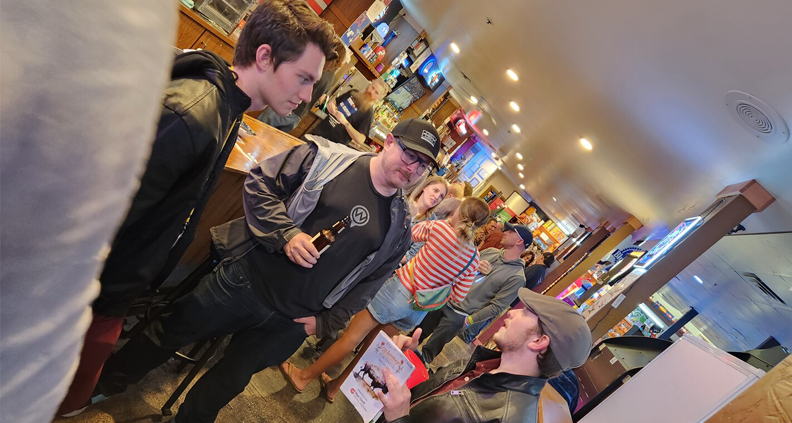Festival Visions: How to Plan Out a Festival Run
The world of film festivals can be opaque. The amount of festivals to apply to is almost infinite, and it’s easy to feel lost when thinking of which to apply for, which to travel to and which to try and premiere at. There are so many resources on how to make a film, but hardly anything about getting a film seen.
Rudi Womack aims to fix that. He’s the Executive Director at the Wyoming International Film Festival and one of the festival’s senior programmers. On Reddit, he posted a seven-part deep dive going into many aspects of what it’s like to both submit and program for a film festival. We spoke with him about defining goals for your festival run, how to strategize what festivals to submit to, and what to do when you actually land.

So let’s say that I have a film and it’s a true indie. What am I going to look for when I’m applying to festivals and going on to places like Film Freeway?
So, before you even get into submitting the festivals, the question you should ask yourself is, what is my ultimate goal with the film? For some people, that goal might be, if they have a short film, they might want to get financing to create a feature. For some people, if they have a feature film, they might want to get distribution or a sales agent or something like that.
So, first, I would say, before you even look at film festivals, identify what your goal is with your film. Then the next step is, you start looking at film festivals that could help you with that goal. So, let’s use the example of trying to get financing to make a feature.
If you have a short, you’re trying to get financing to make a feature. I would be looking at festivals that have producers in attendance or financiers in attendance. I would be looking at festivals in your immediate region where you could do the work of getting financiers and producers in the door so they can see your work.
I would also be looking at festivals that have some kind of a track record of short films then proceeding on to turn into feature films, which is a little bit harder to track down. But if you really follow indie films quite a lot, you’ll be able to start identifying where those short versions of the features played at festivals. So, once you kind of have that pile of film festivals ready, I would then take it one step further and look at which of those festivals have programmed films similar in tone or genre or style to your film.

For instance, if you have a short documentary you’re trying to turn into a feature, you’re going to be looking to more documentary centric festivals. If you have a horror film, you’re going to be looking at festivals that program horror films or rom-com or comedy or whatever. So, from that initial pile of films, you’re able to kind of whittle it down just a little bit further and you’ll have festivals that can help you with your goal and festivals that have programmed films similar to yours.
From there, there’s various other things you can do to even narrow it down further, you know, budget, distance, region, what have you. But in general, those are the two biggest pieces of advice I would say. Identify what your goal is and identify which festivals can help you with that goal. And then from those festivals, identify which ones have programmed films similar to yours.
I love that. So, once the film is made, how should a team look at factoring a festival run into a marketing budget?
In my opinion, your festival funds should be planned out in pre-production. You should have a line item for it. I understand that it’s not always feasible for independent filmmakers, especially truly independent people who are either self-financing or even working off of grants or anything like that, which then gets back into what I was saying earlier about doing your research on festivals because then you can narrow it down so you’re not doing this giant blast out there into the world.
You’re being much more targeted about which festivals you are aiming for and that’s going to help you keep the prices down and that’s going to help you keep your odds up. And then the other thing that you can do is after you’ve done all that research, you can reach out to the festivals directly and tell them, hey, I’ve looked into you, this is what I like, my film would fit, you’ve programmed other films before that are similar to it, I would love to be there, here are my goals. If you can write some of these things in your cover letter, it will kind of separate you from the crowd that just kind of generally submits their film to a bunch of us.
So in terms of strategizing a festival run, there are so many festivals to chose to submit to. There are some that are more high profile than others. Do you recommend trying to go for more high profile out of the gate or trying to cast a wider net?
It entirely depends on A, how much money you have, B, what your strategy and ultimate goal with the film is. I feel like a lot of filmmakers fall into this trap where they make their short film, they submit it to Sundance and they submit it to all these super high profile film festivals that are very expensive to submit to. They’re also extremely competitive.
They get rejected from most, if not all of them, and then they become a little disenfranchised about either themselves, they’re like, oh, I’m not good enough, or they’ll be kind of angry with festivals, like, oh, they just rob us blind, take all of our money, and then they run with it. Instead, I would say, if you are going to be targeting high profile film festivals, you need to be more specific about which ones. If there are any high-profile film festivals in your region, for instance, academy qualifiers, if you’re in Georgia, Atlanta is a great one, because they’re going to have Atlanta-made films in a category for Atlanta-made films. The Florida Film Festival is an academy qualifier. Same thing, if you made a film in Florida or about Florida or something like that. I would say lean into any kind of demographic advantage that you have.
Either the film was made in a certain region, or you, the filmmaker, fit a certain demographic. There are African-American film festivals, there are Jewish film festivals, there are women film festivals. Any kind of advantage that you can give yourself on any of those key demographics is going to help you out.
I am a big champion of what I call a split strategy, and that is going for larger prestige festivals and understanding that you might be the small fish in a big pond at those, while also targeting more local and smaller festivals where you might be the big fish in a small pond, and using some of your success in those lower festivals to angle your way into some of the larger ones. Because a film that has done some amount of play in other festivals could potentially sway the opinion of a programmer at a larger festival.
Great advice. While I was reading your Reddit, one thing that surprised me was how strong you recommended applying to foreign festivals. Why do you see them as being such a good investment?
Two different reasons. One, sometimes what we take for granted is mundane, might be exotic somewhere else. I see this with the Wyoming International Film Festival all the time.
Our audience is very Wyoming-centered, and people might have the wrong impression that Wyoming people are only going to care about cowboy movies, when in reality, they love the foreign films that come because they don’t get to see these films ever. They’re not running through the cinemas, they’re not running through any of the main chains or anything like that. They don’t have access to these kinds of films.

Even on their Netflix or their Hulu or whatever, foreign films tend to be buried under the algorithm. So this is an opportunity for audiences to see something that they don’t get to see very often, and they also get to engage in different cultures and see a part of the world all through the medium of cinema. I feel that as Americans, we get a little too North American-centric, and we kind of ignore film festivals in other places in the world, when in reality, what we might consider is just kind of a run-of-the-mill film here could be something very out-of-the-box for an audience there.
And if you find success in a foreign film festival, you still get audience, you still get traction, you can still get press, and you can still angle all of these things to help you get into more local and regional films in the United States. So it’s never a bad thing to step outside of the box and try an audience that you wouldn’t necessarily think of right away.
When it comes to programming, what are some easy wins for a prospective filmmaker, and what are some red flags or things that might get a film put in the pass bin very quickly?
If we’re talking about films that get put in the pass bin very quickly, they tend to have a lot of technical difficulties. Lighting, acting, sound is such a big one. Sound kills films quicker than anything else, so I always recommend to filmmakers. It’s funny, you go onto Reddit, you go onto some of these forums, filmmakers are always talking about what new cameras and what new lenses and so on and so forth. I wish they would get that enthusiastic about sound, because audience will forgive bad cinematography, they’re not going to forgive bad sound. So those kind of technical bumps are what get things in immediate pass.
But let’s talk about things that get it into a deeper consideration from the programmers. One thing that I love to talk about, I’m an editor, I like to talk about making a film as concise and to the point as possible. Most people understand that as short. It’s a bit of semantics, I disagree. I don’t think short necessarily means better, but I think a more streamlined story means better. Often they go hand in hand, but not necessarily.
If you look at filmmakers like Terrence Malick, he makes films that are quite long, and some might say dry, but I would say each part of it is important, and it is saying a message. And I do think he’s very good at trimming a lot of fat, even though his films are pretty long. So for most filmmakers, a bit of general advice I would give is make your film as concise as possible, and make your story flow as efficiently as possible.
And that alone is going to set you apart from a lot of the other submissions that we get.
Now that I’m at a festival, what do you do once you’re there to get the most out of your time?
I could talk about this for an hour! Maximizing your film festival run. So let’s talk about micro, let’s talk about macro, because there is both. So micro is you are physically in the building at a film festival, you’re there, what do you do now?
The most important part of a film festival in today’s market for a filmmaker is networking, particularly lateral networking. It’s not sexy, it’s not fun, it’s not the Hollywood dream every filmmaker has of I’m going to go to a film festival, Steven Spielberg’s going to discover me, and I’ll be rich and famous. Lateral networking is meeting those other directors, cinematographers, editors, casting person, actors, whoever, that are kind of at your same level, gravitating with them, networking with them, and then moving on to create other films with them.

For me as an editor, I love film festivals because I’m swimming in a sea of directors and they all hate editing. It’s great for me for job prospects. In my opinion, if you’re at a film festival, the ways to maximize it are go to as many films as possible, speak with as many filmmakers as possible, get your card in front of as many filmmakers as possible, invite as many people to your screening.
If there are news or press, you can ask the film festival. Oftentimes they have a list of press that they work with. So speak to as much press as possible. Podcasts are huge and almost every city on earth has somebody doing some kind of a film podcast. So those are always great to go and talk with those people.
And go to every single networking event that you can. That’s parties, that’s tours, that’s whatever.
An odd piece of advice that I give filmmakers is try and build in some time where you can get away from the film festival. Go explore the city, go have an adventure, go meet the locals, go see what that city is about, what its personality is. That might inspire you for your next project or you might meet interesting people inside of the city that have nothing to do with filmmaking but they might have interesting stories. It’s one of the reasons I love going to film festivals. I get to travel so much and I get to meet so many people.
So that’s kind of a broad bullet-pointed micro view of what to do at a festival. For macro, I think scheduling which film festivals in what order that you want to play in can help you because that can help you start angling press. It can also start helping you build your audience and build a following for your film.
It also helps you with budgeting because budgeting is always a struggle for independent filmmakers and going to film festivals does cost a lot of money. But one of the most important things is audience feedback.
If you stack a couple of film festivals early on and then give yourself a bit of a break, you might find that with audience feedback you might want to re-edit or re-examine a part of your film, a scene, a character or something like that. You might hone it down a little bit more. If it’s comedy, are the jokes lame? If it’s a horror, are the audience responding? Are they scared when the bad guy comes out or whatever it is? If it’s a drama and you’re wanting to get tears at a certain moment and you don’t have those, is there any audience feedback that you can do to help you refine and hone your edit so it will have more success later on?
And then of course, looking at a macro festival run, any kind of press, any kind of reviews, any kind of audience review that you have of your film, share that with some of the other festivals. Show them that you are active, you are a participant in your own film and that you are going to do the hard work it takes to promote and constantly push your film.
***
For over 40 years, Film Independent has helped filmmakers get their projects made and seen. The nonprofit organization’s core mission is to champion creative independence in visual storytelling and support a community of artists who embody diversity, innovation and uniqueness of vision.
Film Independent Members watch nominees and vote for the winners of the Spirit Awards. To become a Member of Film Independent and make your vote count for next year’s 40th Annual Spirit Awards, just click here. To support our mission with a donation, click here.
